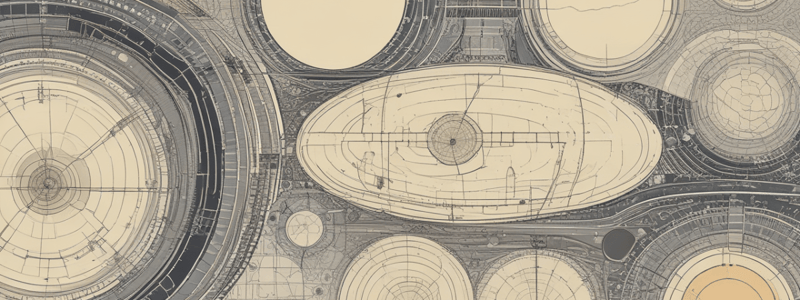Podcast
Questions and Answers
What is the primary reason for measuring physical quantities?
What is the primary reason for measuring physical quantities?
- To calculate the exact value of an object's temperature
- To communicate clearly about quantities of matter (correct)
- To compare the size of different objects
- To convert between different units of measurement
What is the SI unit of measurement for length?
What is the SI unit of measurement for length?
- Kilometre
- Millimetre
- Metre (correct)
- Centimetre
Which instrument is used to measure time?
Which instrument is used to measure time?
- Stopwatch (correct)
- Metre rule
- Thermometer
- Balance
What is the relationship between a millimetre and a metre?
What is the relationship between a millimetre and a metre?
What is the unit of measurement for the volume of a liquid?
What is the unit of measurement for the volume of a liquid?
Why are standard units of measurement necessary?
Why are standard units of measurement necessary?
What is the purpose of estimating in measurement?
What is the purpose of estimating in measurement?
What is the relationship between a cubic centimetre and a millilitre?
What is the relationship between a cubic centimetre and a millilitre?
Study Notes
Measuring and Units of Measurement
- Measuring is the process of determining the size, mass, and/or temperature of a quantity of matter or a period of time using instruments marked in standard units.
- Measuring is necessary for clear communication about any quantity of matter.
- The main physical quantities that can be measured are dimensions, volume, mass, time, and temperature.
Physical Quantities and Their Units
- Dimensions: size of an object in terms of length, width, height, or depth, measured in meters (m).
- Volume: amount of space an object occupies, often measured in liters (l) and milliliters (ml).
- Mass: amount of matter an object contains, measured in kilograms (kg).
- Time: duration of an event, measured in seconds (s).
- Temperature: how hot an object is, measured in Kelvin (K).
Standard Units of Measurement
-
The International System of Units (SI) is used to ensure consistent and global measurements.
-
SI units are used for comparisons in science, and they are shown in the table below:
- Length: meter (m)
- Mass: kilogram (kg)
- Time: second (s)
- Temperature: Kelvin (K)
Multiple and Submultiple Units
- Multiple and submultiple units have names, such as:
- 1 kilometer = 1000 meters (1km = 1000m)
- 1 centimeter = 1/100 meter (1cm = 1/100m)
- 1 millimeter = 1/1000 meter (1mm = 1/1000m)
Importance of Measuring Instruments
- Estimating is not reliable, and our senses are not accurate.
- Specifically designed measuring instruments and standard units are necessary to obtain consistent and global information.
- Measuring instruments include meter rules, tape measures, calipers, balances, stopwatches, clocks, and thermometers.
Studying That Suits You
Use AI to generate personalized quizzes and flashcards to suit your learning preferences.
Description
Learn about the importance of measuring physical quantities such as dimensions, volume, and mass in physics. Understand how measurement helps in clear communication about quantities of matter.




